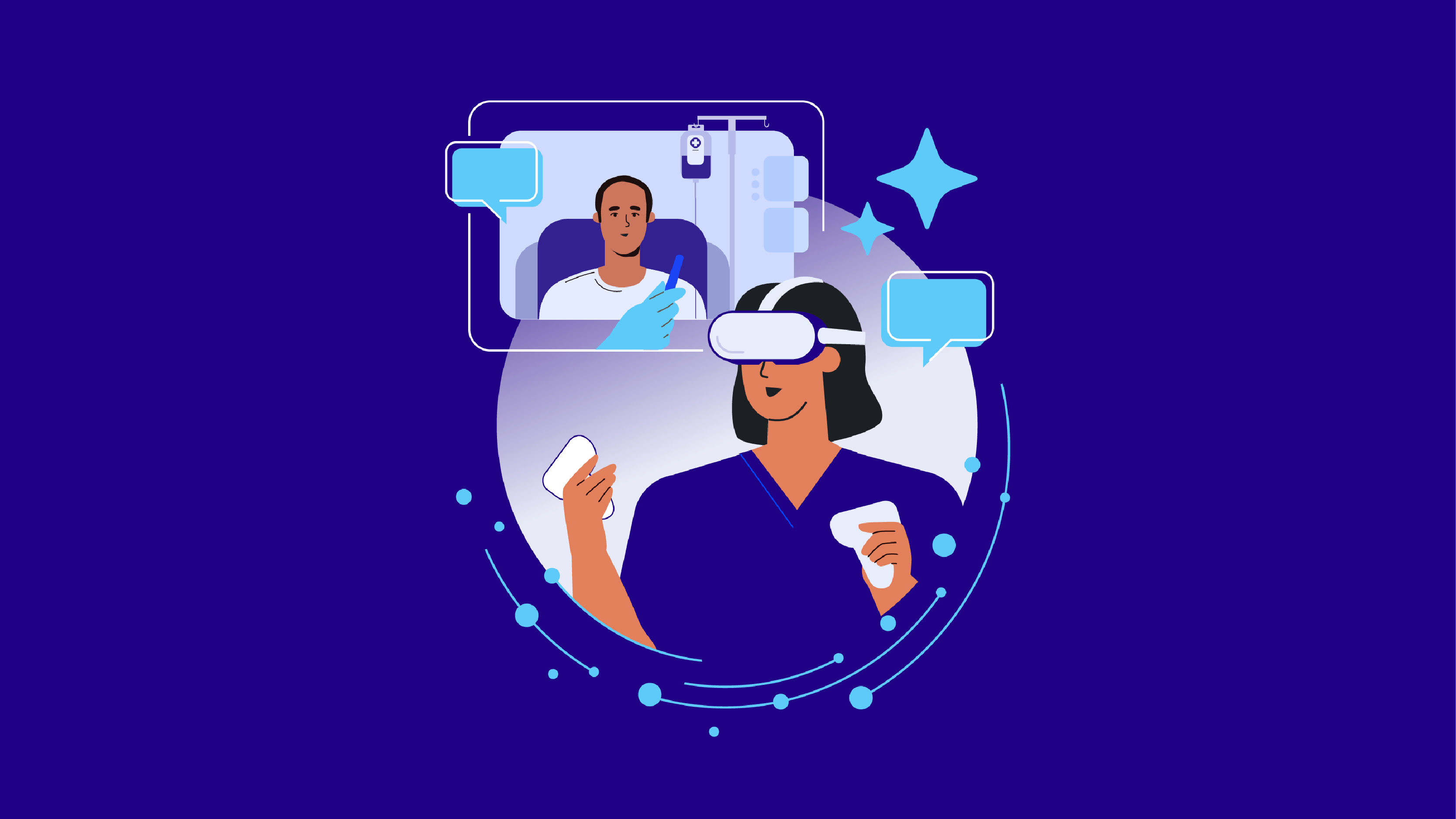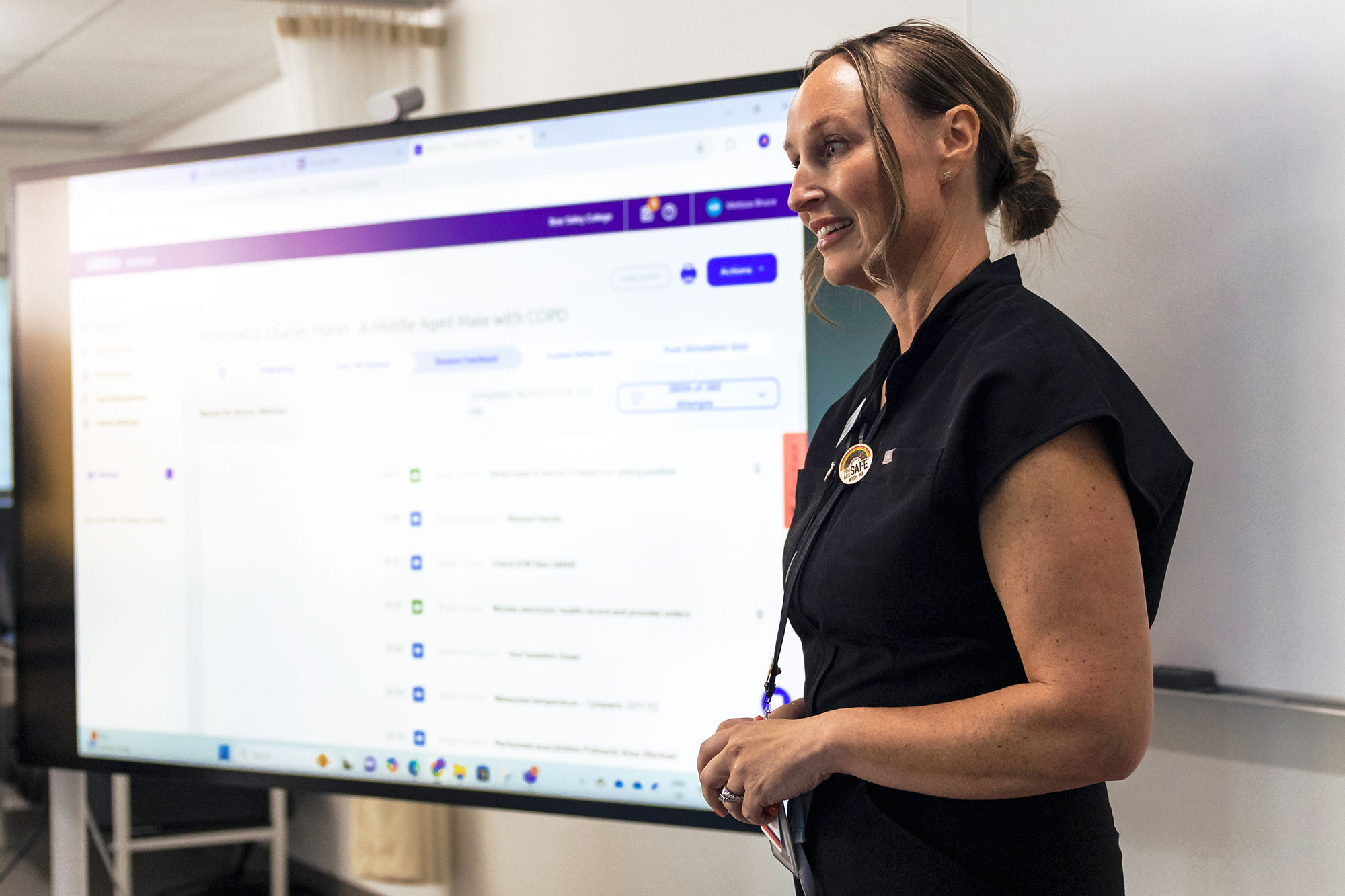Revolutionizing Healthcare Training: Virtual Reality Simulations for Complex Patient Cases

Table of Contents
Name of the heading
1- Start your table with the syntax {start-table}
2 - Add an H3 Heading to create a new column (this will be the column title)
3 - List cells as bullet points in a List element
4 - End your table with the syntax {end-table}
Working with complex patient cases like diabetes or opioid toxicity can be challenging for a newly graduated medical student or a nurse new to a particular population. How do we train students and medical professionals for the unpredictability of complex cases?
Research (made available by the NIH) has shown that virtual reality (VR) is one modality that can be beneficial to use alongside other modalities. This cutting-edge technology allows medical professionals to use lifelike simulations that mimic real-world clinical situations.
By incorporating VR technology through complex patient scenarios, this simulation approach provides a safe and controlled learning environment for learners to develop and enhance their clinical skills, judgment, and reasoning.
In virtual reality simulation, learners can interact with virtual patients, medical equipment, and healthcare settings, which accurately replicate real-life clinical settings. These virtual scenarios are designed to challenge learners by presenting complex patient cases, unpredictable situations, and varying difficulty levels.
VR Training for Specific Medical Fields
VR training has emerged as an innovative and effective approach to preparing professionals for complex scenarios in various medical fields. This immersive technology offers a simulated environment replicating real-life situations, allowing learners to gain valuable experience and improve their skills in a safe and controlled setting.
Here are some of the fields using VR training:
Virtual Reality Training for Nursing Students
Virtual reality training provides nursing students a unique opportunity to bridge the gap between theory and practice. Students can develop critical thinking skills and enhance clinical judgment by immersing themselves in realistic patient scenarios. Through VR simulations, they can practice assessing patient conditions, making informed decisions, and coordinating care with other providers.
“Meta-analysis results showed that virtual reality technology significantly enhances nursing students’ theoretical knowledge, practical skills, skill retention, and satisfaction levels, in comparison with traditional or alternative teaching methodologies.”
One of the advantages of VR training for nursing students is the ability to experience a wide range of patient scenarios, including complex and rare cases. This exposure prepares students for unexpected challenges they may face in their future careers. Students can build confidence and develop the necessary skills to provide high-quality patient care by navigating these scenarios in a virtual setting.
UbiSim is a VR training platform built by nurses just for nursing students and practicing nurses, offering a variety of complex scenarios such as:
- Anaphylaxis
- Myocardial infarction
- Diabetic ketoacidosis (DKA)
- Opioid toxicity
- Transfusion reaction
Virtual Reality Training for Nurses
Even after becoming registered nurses, professionals in the field can benefit from ongoing training and skill development. Virtual reality simulations offer a means of enhancing their competence and addressing specific areas of improvement. Nurses can refine clinical reasoning and sharpen decision-making abilities by engaging in realistic scenarios.
VR training for nurses can also be tailored to address complex patient scenarios that they may encounter in specialized areas such as critical care, emergency medicine, or mental health care.
By immersing themselves in these scenarios, nurses can practice assessing and managing patients with diverse needs, honing their skills in a risk-free environment. Furthermore, VR training can help improve their communication and collaboration skills in complex multidisciplinary healthcare settings.
Boston Children’s Hospital uses UbiSim to onboard and continuously train its nurses. Read the whole case study.
Virtual Reality Simulation for Medical Professionals
Beyond nursing, virtual reality simulation is valuable for many medical professionals. Surgeons, anesthesiologists, and other specialists can benefit from immersive simulations that mimic the operating room environment. By practicing surgical procedures and other medical interventions in VR, medical professionals can refine their techniques, improve patient outcomes, and enhance patient safety.
In addition, virtual reality simulation can be utilized for training healthcare providers in areas such as medical procedures, clinical skills, and clinical reasoning. By engaging in realistic scenarios, medical professionals can develop proficiency in handling complex patient situations.
VR training offers a practical and efficient way to augment traditional educational methods and ensure that medical professionals are adequately prepared to deliver the highest standard of care.
Virtual Reality Simulation for Healthcare Providers
For healthcare providers, virtual reality simulation offers a valuable tool for continuing education and professional development. By immersing themselves in realistic scenarios, providers can practice critical decision-making and refine their clinical skills. This immersive training can enhance their ability to deliver optimal patient care and improve patient outcomes.
Moreover, virtual reality simulation can be particularly beneficial in addressing specific challenges healthcare providers face. For example, simulations can be designed to train providers in managing mental health crises, handling emergency situations, or making rapid and accurate diagnoses. By practicing these scenarios in a controlled virtual environment, healthcare providers can build confidence and competence in addressing challenging cases.
Benefits of Virtual Reality Simulation for Complex Patient Scenarios
Virtual reality (VR) simulation offers a range of benefits that make it a valuable tool for training healthcare professionals in handling complex patient scenarios. Let's explore some of these benefits in detail:
1. Realistic Environment in Virtual Reality Simulation
Virtual reality (VR) simulation enhances healthcare training by creating a highly realistic environment mimicking real-life clinical settings. This immersive experience allows learners to practice in a safe, controlled space, effectively developing their clinical skills without the risks of live patient interactions.
A study emphasizes the benefits of these realistic simulations, noting their role in increasing learner satisfaction and effectiveness in learning. High-fidelity VR scenarios facilitate easier visualization of patient anatomy and offer an interactive experience, making them an invaluable tool in healthcare education.
2. Enhanced clinical judgment
VR simulation offers a significant advantage in enhancing clinical judgment among healthcare professionals. Engaging in virtual scenarios can develop decision-making, critical thinking, and problem-solving skills. This training is vital for practicing the assessment and diagnosis of complex patient conditions and making informed treatment decisions.
Consequently, healthcare professionals are better equipped to handle real-life situations confidently and competently. Research supports this, indicating that virtual simulation is instrumental in developing clinical judgment skills.
3. Psychological safety
Patient safety is paramount, and virtual reality simulation prioritizes psychological safety for healthcare professionals. By practicing in a virtual environment, healthcare professionals can make mistakes without risking harm to real patients.
This creates a safe space for learning, allowing them to experiment, learn from their errors, and refine their skills without the fear of negative consequences. This psychological safety fosters a culture of continuous improvement and enables healthcare professionals to gain valuable experience without compromising patient well-being.
Kara Moriarty, Assistant Professor of Nursing at Cape Cod Community College, discussed students experiencing this phenomenon in UbiSim’s VR training platform: “They call it psychological safety now, meaning students feel comfortable in VR. When they don’t feel like they’re in an environment where they’re going to be judged by faculty or peers in class, and you make it a safe space, they really enjoy it.”
4. Customizable scenarios
Virtual reality simulation offers the advantage of customizable scenarios, allowing healthcare professionals to tailor the training to their specific needs. Whether it's emergency scenarios, rare medical conditions, or specific procedures, VR can create simulated environments that precisely mimic the challenges healthcare professionals may face in their practice. This level of customization ensures that the training is relevant and targeted, providing learners with opportunities to practice and master skills that are directly applicable to their field of expertise.
UbiSim’s Intuitive Editor enables educators to tailor scenarios to their specific training needs. For example, Boston Children’s Hospital created its own pediatric sepsis scenario. Looking for a VR training platform that you can customize to meet your needs? Schedule a demo with UbiSim today.
Final Thoughts
Virtual reality training and simulation hold immense potential for preparing professionals in various fields for complex patient scenarios. Whether for nursing students, nurses, or other healthcare providers, VR training offers a safe, immersive, and efficient means of developing critical skills and improving patient care.
FAQs
Heading 1
Heading 2
Heading 3
Heading 4
Heading 5
Heading 6
Lorem ipsum dolor sit amet, consectetur adipiscing elit, sed do eiusmod tempor incididunt ut labore et dolore magna aliqua. Ut enim ad minim veniam, quis nostrud exercitation ullamco laboris nisi ut aliquip ex ea commodo consequat. Duis aute irure dolor in reprehenderit in voluptate velit esse cillum dolore eu fugiat nulla pariatur.
Block quote
Ordered list
- Item 1
- Item 2
- Item 3
Unordered list
- Item A
- Item B
- Item C
Bold text
Emphasis
Superscript
Subscript
Explore more

Why Q1 Decisions Determine Your Nursing Workforce Pipeline
Why January–March decisions shape nursing workforce capacity, readiness, and retention, and how early action strengthens the pipeline.

From 30 Minutes to 3: How AI Enhanced Analytics Transforms Debriefing Preparation
AI Enhanced Analytics: Scenario Performance Data now available in UbiSim's Version 1.19
.jpg)
Behind the Scenes: How We Brought Incisions & Dressings to Life in VR
How the UbiSim team built a VR system displaying 300+ distinct incision states—balancing clinical accuracy, technical constraints, and nursing education needs.



